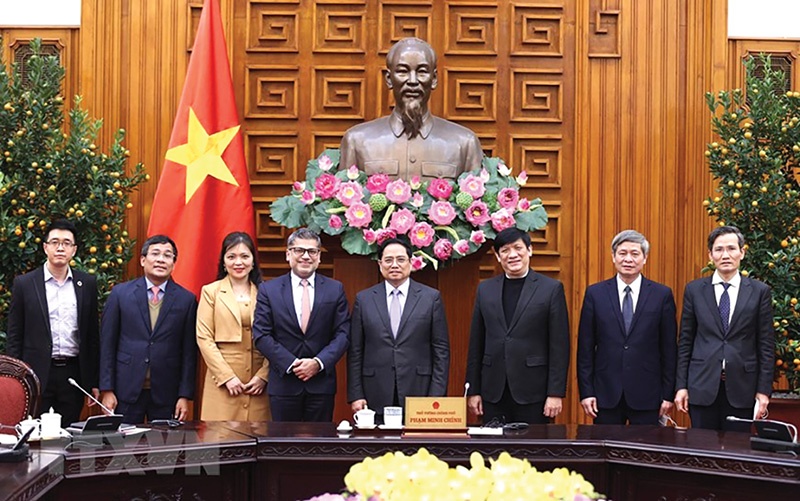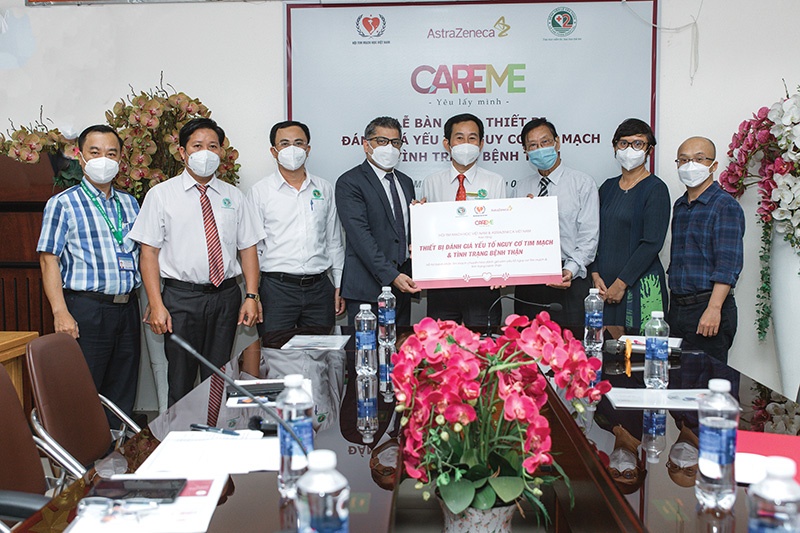AstraZeneca “Immunocompromised patients need extra COVID-19 protection”
 |
| AstraZeneca Vietnam met with PM Pham Minh Chinh and high-level officials in January |
AstraZeneca has delivered 2.8 billion doses of its COVID-19 vaccine across the world so far. What is the most important lesson that you have learned during this period?
In recognition of Vietnam Physicians’ Day, I would like to send my heartfelt thanks to the heroic healthcare leaders, staff, and volunteers who have and continue to dedicate themselves to saving lives and taking care of us day and night.
One major lesson I’ve learned is that we live in wildly different and diverse realities. Thanks to the Vietnamese government’s effective vaccine diplomacy and vaccination strategy, to which we at AstraZeneca are very honoured to contribute, most teenagers and adults in Vietnam have received at least two doses if not three. However, while we are already living safely with the virus, 2-3 per cent of the population continues to live in fear.
There are millions of people who cannot take a vaccine, or who have been vaccinated but are immunocompromised or at increased risk because of their work or living situation. Since immunocompromised patients cannot develop the needed degree of protection following COVID-19 vaccination, many of them have to stay in and avoid family gatherings or other social activities, worried that if infected with coronavirus, they would be at higher risk of severe disease. Most hospitalised cases now fall under this group.
Amidst the ongoing surge of cases due to the new Omicron variant, we are looking forward to supporting the Vietnamese government to urgently deliver innovative solutions, in addition to vaccines, to meet patients’ unmet need for extra protection and help doctors reduce the number of hospitalisations.
 |
| AstraZeneca is supporting Vietnam National Heart Association to donate CaReMe risk assessment kiosks to hospitals |
What are AstraZeneca Vietnam’s priorities moving forward?
As part of our Partnership for Health System Sustainability and Resilience, in collaboration with the World Economic Forum, London School of Economics, and the Health Strategy and Policy Institute (HSPI), our research shows that a health system needs to not only mitigate, overcome and rebound quickly from shocks, but also continually manage underlying health challenges and evolving medical burdens.
Every health system’s priority has been to control the pandemic and treat patients. However, this leads to a huge backlog of patients with severe non-communicable diseases such as cancer, chronic kidney disease, and heart disease who are unable to access the care, medicines, or surgeries they need. This situation can be remedied by providing quality telehealth, ensuring continuity of medical supplies, and strengthening the domestic pharmaceutical manufacturing capabilities.
AstraZeneca welcomes the government’s resolutions and decisions issued recently in support of these goals. We will do our part by investing a total of $310 million from 2020-2030 into research and development, tech transfer, and local contract manufacturing of key medicines in Vietnam, and partnering closely with the Ministry of Health to strengthen the health system’s sustainability and resilience.
In terms of reducing the disease burden, we’re expanding our Healthy Lung and CaReMe programmes to increase disease awareness, early detection, treatment, and management of respiratory, lung cancer, and cardiovascular-renal-metabolic diseases.
What is your outlook on the post-pandemic future of the Vietnamese healthcare sector?
Our outlook on Vietnam as a whole, and this is shared by the British business community in Vietnam, is confident and optimistic. Soon enough, borders will be reopened and international flights and tourism resumed. Even though there will surely be road bumps, we are confident that the Vietnamese government’s progressive strategy and effective public-private partnerships will keep us on the right track towards full recovery.
More particularly regarding the health sector, given the unprecedented public and political interest and support it is receiving, and informed by high-quality research produced by HSPI and other organisations, it will certainly bounce back stronger.
We are committed to reinforcing the Vietnamese health system and helping to ensure that it can withstand future challenges beyond this pandemic.
What the stars mean:
★ Poor ★ ★ Promising ★★★ Good ★★★★ Very good ★★★★★ Exceptional
Themes: Healthcare Platform
- Hanoi intensifies airport monitoring amid Nipah disease risks
- Cosmetics rules set for overhaul under draft decree
- Policy obstacles being addressed in drug licensing and renewal
- Sanofi, Long Chau Pharmacy relaunch medicine blister pack collection initiative
- Takeda Vietnam awarded for ongoing support of Vietnam’s sustainability efforts
Related Contents
Latest News
More News
- State corporations poised to drive 2026 growth (February 03, 2026 | 13:58)
- Why high-tech talent will define Vietnam’s growth (February 02, 2026 | 10:47)
- FMCG resilience amid varying storms (February 02, 2026 | 10:00)
- Customs reforms strengthen business confidence, support trade growth (February 01, 2026 | 08:20)
- Vietnam and US to launch sixth trade negotiation round (January 30, 2026 | 15:19)
- Digital publishing emerges as key growth driver in Vietnam (January 30, 2026 | 10:59)
- EVN signs key contract for Tri An hydropower expansion (January 30, 2026 | 10:57)
- Vietnam to lead trade growth in ASEAN (January 29, 2026 | 15:08)
- Carlsberg Vietnam delivers Lunar New Year support in central region (January 28, 2026 | 17:19)
- TikTok penalised $35,000 in Vietnam for consumer protection violations (January 28, 2026 | 17:15)

 Tag:
Tag:




















 Mobile Version
Mobile Version